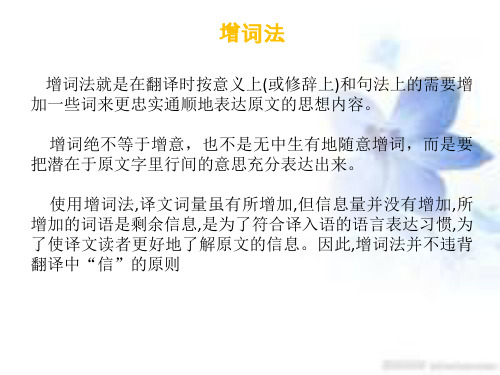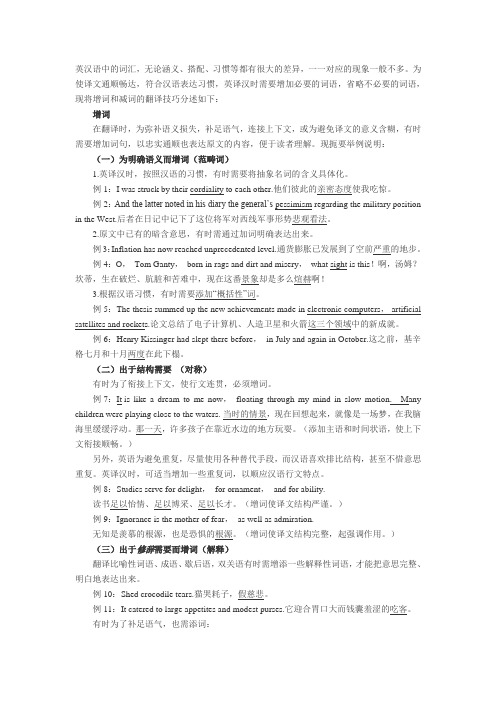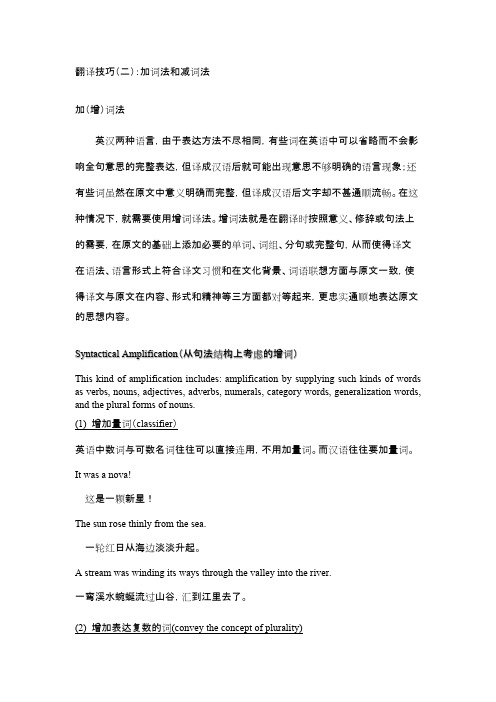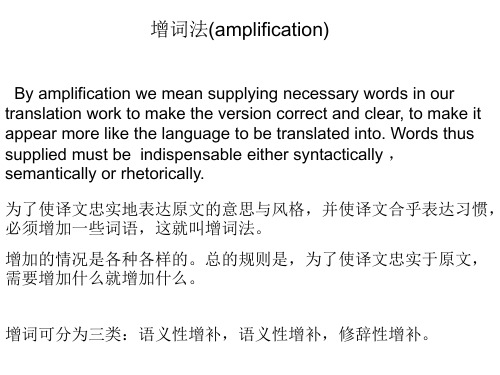英语翻译技巧第九节增词法
翻译基础增词法

在翻译过程中,有时需要补充一些背 景信息才能使译文更加完整和易于理 解。
解释抽象概念
对于一些抽象的概念或比喻,增词法 可以帮助解释其含义,使译文更加清 晰。
转换表达方式
在翻译过程中,有时需要改变原文的 表达方式才能更好地适应目标语言的 习惯。
补充语义信息
在翻译过程中,有时需要补充一些语 义信息才能使译文更加准确和完整。
调整语序
在翻译过程中,为了使译文更加 符合目标语言的表达习惯,可以 对原文的语序进行调整。
文化准确性
增补文化背景
在翻译过程中,如果原文中涉及到某 些特定的文化背景知识,为了使译文 更加符合目标文化的认知,可以在译 文中增加相关的文化背景解释。
增补人物名称
在翻译过程中,如果原文中涉及到某 些特定的人物名称,为了使译文更加 符合目标文化的认知,可以在译文中 增加相关的人物名称。
02
过度增词会导致译文冗余,降 低可读性,甚至可能改变原文 的含义。
03
在进行增词时,需要仔细权衡 ,确保增词的内容是原文含义 所必需的,并且符合目标语言 的表达习惯。
注意语境与语义的匹配
01
在增词时,需要考虑上下文语境,确保增词的内容与原文的 语境相符合。
02
语义的匹配同样重要,增词的内容应当准确地传达原文的含 义,避免产生歧义或误解。
04
翻译基础增词法的要点包括准确理解原文含义、合理增加词汇、保持 原文风格和流畅性以及遵循目标语言的语法规则和表达习惯。
对未来研究的展望
随着全球化的加速和跨文化交流的增多,翻译基础增 词法的研究和应用将更加重要。
输标02入题
未来研究可以进一步探讨翻译基础增词法的理论依据 和实施原则,建立更加科学和系统的增词方法论体系。
英文翻译技巧之增词法与减词法

英文翻译技巧之增词法与减词法英汉两种语言,由于表达方式不尽相同,翻译时既可能要将词类加以转换,又可能要在词量上加以增减。
增词法与减词法在英汉互译中运用相当广泛,但无论增词还是减词,增减的是词,不是意。
一、增词法所谓增词法,就是在翻译时,为了使译文合乎汉语的习惯和表达规律,为了使意思更加明确,从意义、修辞和句法上需要在译文中适当增添一些虽无其词而有其意的词。
增词译法不是凭空想象,必须增之有道,补之有理。
必要的增词对一个句子起着画龙点睛的作用,准确、通顺和完整地表达原文的内容,避免语义模糊。
例1:Packing together with packaging is designed not only as a form of protection but also a form to facilitate handling, storage, to prevent pilferage and what's more to help promote the sales.译文:包装和包装方法不仅仅是为了保护商品,也是为了便利搬运和库存、防止盗窃,更重要的是,有助于促销。
解析:“protection”此处译作“保护商品”,加了“商品”两字,显然比译作“保护”更好。
1.增加原文中省略的部分英语中有省略现象,译为汉语时往往要根据句法需要补出英文中省略的成分,主要包括回答中的省略、动词的省略及比较句中的省略等;另外,为表示态度、逻辑关系等,也需要加词。
(1)增补回答句中省略的词语1例2:—He doesn’t know, does he?—Yes, he does.译文:——他不知道吧?——不,他知道。
例3:—Did you enjoy your time in Beijing?—Yes, I did.译文:——你在北京过得愉快吗?——是的,我过得很愉快。
(2)增补并列结构中省略的词语例4:On average, the economy performs less well in a president's second term than in his first.That pattern probably does not apply to Mr Obama. Since his first term was so difficult, the next, by rights, ought to be better.译文:一般来说,美国总统第二个任期内的经济不如第一任期。
汉英翻译9增词法资料

1.Gathering my faculties, I looked about me. Rain, wind and darkness filled the air.
等恢复正常后, 我向四周看了看, 空中充满了风、雨和黑暗。 (祝庆英译)
2. 就她的年龄而言,她看上去很年轻。 She looks quite young for her age.
增加原文隐含意思
汉语和英语的表达方式不同。汉语表达力求简洁,削尽繁琐,但翻译成英 语时要把隐含的意思表达出来。
1.老同志应该支持中青年干部的工作,担负起传、帮、带的任务。 Old veterans should support the young and middle-aged cadres in
在信息的传递中, 信息是可以转换的, 即从一种形态转换成另一种形 态, 而信息量基本不变。由于人类思维的共性, 这就使一种语言转换成 另一种语言有了可能性。但是, 由于目的语读者对原语的语言知识和 文化背景知识的理解不及原文读者, 如果把同等的信息量用同样长度 的语言结构来表达, 就给交流带来了困难。
1.在人权领域,中国反对以大欺小,以强凌弱。 In the field of human rights, China opposes the practice of the big
oppressing the small and the strong bullying the weak.
2. 这人真是杞人忧天。 He is nearly like the man of Chi who was haunted by the fear that sky
增词

英汉语中的词汇,无论涵义、搭配、习惯等都有很大的差异,一一对应的现象一般不多。
为使译文通顺畅达,符合汉语表达习惯,英译汉时需要增加必要的词语,省略不必要的词语,现将增词和减词的翻译技巧分述如下:增词在翻译时,为弥补语义损失,补足语气,连接上下文,或为避免译文的意义含糊,有时需要增加词句,以忠实通顺也表达原文的内容,便于读者理解。
现扼要举例说明:(一)为明确语义而增词(范畴词)1.英译汉时,按照汉语的习惯,有时需要将抽象名词的含义具体化。
例1:I was struck by their cordiality to each other.他们彼此的亲密态度使我吃惊。
例2:And the latter noted in his diary the general’s pessimism regarding the military position in the West.后者在日记中记下了这位将军对西线军事形势悲观看法。
2.原文中已有的暗含意思,有时需通过加词明确表达出来。
例3:Inflation has now reached unprecedented level.通货膨胀已发展到了空前严重的地步。
例4:O,Tom Ganty,born in rags and dirt and misery,what sight is this!啊,汤姆?坎蒂,生在破烂、肮脏和苦难中,现在这番景象却是多么煊赫啊!3.根据汉语习惯,有时需要添加“概括性”词。
例5:The thesis summed up the new achievements made in electronic computers, artificial satellites and rockets.论文总结了电子计算机、人造卫星和火箭这三个领域中的新成就。
例6:Henry Kissinger had slept there before,in July and again in October.这之前,基辛格七月和十月两度在此下榻。
英语翻译技巧第九节增词法

英语翻译技巧第九节增词法第九节增词法增词法不是无中生有地随意增词,而是增加原文中虽无其词但有其意得一些词。
一、根据意义上或修辞上的需要(一)增加动词1.In the evening, after the banquets, the concerts and the tabletennis exhibitions, he would work on the drafting of the final communiqué.2.Rostow was chosen to be a very influential intellectual by thetop-ranking officials-------- the wrong man at the wrong placewith the wrong idea.3.There were no speeches, no foreign diplomats, no ordinarypeople with flowers.4.They had been through it all at the side of our Party----long-term wars, the terrible hardships of hunger and cold, and ruined families------until at last, in 1949, they were able to savor the sweet taste of triumph.1.晚上在参加宴会、出席音乐会、观看乒乓球表演之后,他还得起草最后公报。
2.高层官员们选择罗斯托成为一个很有影响的知识分子,这真是在错误的地方任用错误的人去实行官员的错误主张。
3.没有发表讲话,没有各国外交官到场,也没有普通人手持花束欢迎的场面。
4.他们始终站在我们党的一边,经历过长期战争,忍受过饥寒交迫,遭受过家破人亡,好不容易熬到1949年,他们才尝到了胜利的甜头。
翻译技巧:加词法和减词法

翻译技巧(二):加词法和减词法加(增)词法英汉两种语言,由于表达方法不尽相同,有些词在英语中可以省略而不会影响全句意思的完整表达,但译成汉语后就可能出现意思不够明确的语言现象;还有些词虽然在原文中意义明确而完整,但译成汉语后文字却不甚通顺流畅。
在这种情况下,就需要使用增词译法。
增词法就是在翻译时按照意义、修辞或句法上的需要,在原文的基础上添加必要的单词、词组、分句或完整句,从而使得译文在语法、语言形式上符合译文习惯和在文化背景、词语联想方面与原文一致,使得译文与原文在内容、形式和精神等三方面都对等起来,更忠实通顺地表达原文的思想内容。
Syntactical Amplification(从句法结构上考虑的增词)This kind of amplification includes: amplification by supplying such kinds of words as verbs, nouns, adjectives, adverbs, numerals, category words, generalization words, and the plural forms of nouns.(1) 增加量词(classifier)英语中数词与可数名词往往可以直接连用,不用加量词。
而汉语往往要加量词。
It was a nova!这是一颗新星!The sun rose thinly from the sea.一轮红日从海边淡淡升起。
A stream was winding its ways through the valley into the river.一弯溪水蜿蜒流过山谷,汇到江里去了。
(2) 增加表达复数的词(convey the concept of plurality)汉语中的名词没有复数概念,也没有词形上的变化,很多情况下不必表达出来;而英语中的名词有词形的变化,但没有量词,所以在翻译成汉语的时候,可根据情况增加重叠词、数词或其他一些词来表达复数的概念,以达到修辞效果。
翻译增词法(amplification)

语义性增补(semantic amplification)
为了使语义明确,畅达通顺,符合汉语的习惯,翻译中常常根 据意义的需要增加动词、名词、形容词、副词、量词、范畴词、 概括词,以及表示名词的负数、动词时态等方面的词。
1.Mary washed for a living after her husband died of acute pneumonia.
码丽在丈夫患急性肺炎去世后,靠给人洗衣服维持生活。
2。When I came to I was in the water, swimming automatically, though I was about two thirds drowned.
当我醒来时,发觉自己在水里,虽然浸得半死,却本能地 浮着。
毫无疑问,他以为会有热烈的拥抱,满桌的食物,激动的泪水, 欢乐的笑声,一段接一段的谈话,一次又一次的拥抱,没完没 了。(增加了三个形容词,形象描绘了他想象中的欢乐场景, 使表达更加生动)
2。The sky is clear blue now the sun has flung diamonds down on meadow and bank and wood. 此时已是万里蓝天,太阳把颗颗光彩夺目的钻石洒向草原,洒 向河岸,洒向树林。(增补形容词)
英语中常用省略句,翻译时要根据汉语的表达习惯,作些适当的增 补。
Any person not putting litter in this basket will be liable to a fine of $ 5. 任何不把凌乱的东西放入这个筐内而任意乱扔的人将被处以五美圆 罚款。(增补any person后省略的leaving litter about instead of这一部分。)
最新英语翻译技巧-增词法

最新英语翻译技巧-增词法2022最新英语翻译技巧-增词法翻译是在准确(信)、通顺(达)、优美(雅)的基础上,把一种语言信息转变成另一种语言信息的行为。
下面是店铺帮大家整理的最新英语翻译技巧-增词法,希望对大家有所帮助。
所谓增词法,就是在翻译时按意义上(或修辞上)和句法上的需要增加一些词来更忠实通顺地表达原文的思想内容。
用增词法翻译技巧的目的是为了更加准确、通顺和完整的表达原文的内容。
当然不能无中生有地随意增词,而是增加原文中虽无其词而有其意的'一些词。
(一)增补回答句中省略的词语Do you like sport? Yes, I do.你喜欢体育运动吗?是的,我喜欢体育运动。
Are you tired? Not very.你累了吗?不太累。
(二)增补并列结构中省略的词语We don't retreat, we never have and never will。
我们不后退,我们从没有后退过,将来也决不后退。
(we never have and never will=we never have retreated and never will retreat)A fool and his words are soon parted; a man of genius and his money.愚人会很快忘记说过的话,智者会很快放弃手里的钱。
(a man of genius and his money=a man of genius and his money are soon parted)(三)增补表示逻辑关系或者平衡结构的词语有时候英语原文中并没有表达逻辑关系的词语,但根据上文可以判断出其隐含的逻辑关系,如假设、让步、因果关系等,在翻译时要适当加以补充。
Without a sense of your fault, how can repentance andamendment be expected?如果对自己的错误都不能认识到,怎么能指望你会悔改呢?Students should learn from teachers and vice versa.学生应该向老师学习,老师也应该向学生学习。
- 1、下载文档前请自行甄别文档内容的完整性,平台不提供额外的编辑、内容补充、找答案等附加服务。
- 2、"仅部分预览"的文档,不可在线预览部分如存在完整性等问题,可反馈申请退款(可完整预览的文档不适用该条件!)。
- 3、如文档侵犯您的权益,请联系客服反馈,我们会尽快为您处理(人工客服工作时间:9:00-18:30)。
第九节增词法增词法不是无中生有地随意增词,而是增加原文中虽无其词但有其意得一些词。
一、根据意义上或修辞上的需要(一)增加动词1.In the evening, after the banquets, the concerts and the table tennisexhibitions, he would work on the drafting of the final communiqué。
2.Rostow was chosen to be a very influential intellectual by thetop-ranking officials———-—--- the wrong man at the wrong place with the wrong idea.3.There were no speeches, no foreign diplomats, no ordinary people withflowers。
4.They had been through it all at the side of our Party——-- long—termwars, the terrible hardships of hunger and cold, and ruined families ——-—-—until at last, in 1949, they were able to savor the sweet taste of triumph.1.晚上在参加宴会、出席音乐会、观看乒乓球表演之后,他还得起草最后公报.2.高层官员们选择罗斯托成为一个很有影响的知识分子,这真是在错误的地方任用错误的人去实行官员的错误主张。
3.没有发表讲话,没有各国外交官到场,也没有普通人手持花束欢迎的场面.4.他们始终站在我们党的一边,经历过长期战争,忍受过饥寒交迫,遭受过家破人亡,好不容易熬到1949年,他们才尝到了胜利的甜头.作业:1.They talked for almost eight hours, through dinner and well into thenight.2.He favored the efforts to improve relations with all peace—lovingcountries。
3.“Nobody could count on his restraint or rationality,” he said.4.My work, my family, my friends were more than enough to fill my time.(二)增加形容词1.With what enthusiasm the Chinese people are building their country!2.An enemy’s plane twisted in the sky, trailing flame and smoke。
3.O, Tom Canty, born in rags and dirt and misery, what sight is this!(Mark Twain)1.中国人民正在以多么高的热情建设他们的国家啊!2.一架敌机在空中螺旋下降,拖着浓烟烈焰掉了下去。
3.啊,汤姆•康第,生在破烂、肮脏和苦难中,现在这番景象却是多么显赫啊!作业:1.“This is grasping at straws, I know," said the helpless man。
2.With the meeting to begin in just a couple of hours, I hadn’t the timeto worry about such trifles.3.“It’ll make a man of him,” said Jack. “College is the place.”4.He regarded the National Day edition of that paper as a collector’s item.(三)增加副词1.The crowds melted away。
2.As he sat down and began talking, words poured out.3.Tremaine sank down with his face in his hands。
4.In the films of those days, all too often it was the same one: boy tractordriver meets girl tractor driver; they fall in love and drive tractorstogether。
5.He was fascinated by the political processes—-—the wheeling and dealingof presidential politics, the manipulating, releasing and leaking of news, the public and private talks.1.人群渐渐散开了。
2.他一坐下来就讲开了,滔滔不绝地讲个没完。
3.屈里曼两手蒙着脸,一屁股坐了下去。
4.在那时候的电影里,总是老一套:男拖拉机手和女拖拉机手始而相遇,继而相爱,终而并肩开拖拉机了。
5.一幕幕政治花招真使他看入迷了:总统竞选活动中的勾心斗角,尔虞我诈;对新闻消息的幕后操纵、公开发表和有意透露,以及公开和秘密的谈话。
作业:1.Now and then his boots shone.2.A seagull saw the light from my window and darted up to it。
3.They lingered long over his letter。
4.He turned a chair around and straddled it, resting his chin on the back.(四)增加名词1.在不及物动词后面增加名词1)Mary washed for a living after her husband died of acute pneumonia.玛丽在丈夫患急性肺炎去世后,就靠洗衣服维持生活.2)First you borrow, then you beg.头一遭借钱,下一遭就讨饭。
3)Then Lieutenant Grub launched into the old recruiting routine, “See,save and serve! Hannigan, free tour to all the ports in the world。
A fine ship for a home. Three meals a day without charge…You mustn’tlet such a golden opportunity slip by."于是,格拉布上尉开始说起征兵的老一套了:“见见世面,攒点钱,为国家出点力!汉尼根,免费周游世界上所有的港口.一艘上好的船为家,一天三餐不要钱…你千万不要错过这样大好的机会呀!"作业:1.After sailing round the world, he began to see things and tounderstand。
2.He ate and drank, for he was exhausted。
3.Day after day she goes to her work in different family--——sweeping, washing, cleaning.2.在形容词前增加名词1)This typewriter is indeed cheap and fine。
这部打字机真是价廉物美。
2)A new kind of aircraft—--— small, cheap, pilotless——— is attracting increasing attention。
一种新型的飞机正越来越引起人们的注意----—这种飞机体积不大,价格便宜,无人驾驶。
3)He is a complicated man-—— moody, mercurial, with a melancholy streak。
他是一个性格复杂的人——---—喜怒无常,反复多变,有些忧郁寡欢。
作业:1.He was wrinkled and black, with scant gray hair.2.The old tourists, weary but game, decided to take a break.3.Stephen came out of the hot factory into the damp wind and cold wetstreets, haggard and worn。
3.在抽象名词后增加名词To persuade说服 persuasion说服工作To prepare 准备 preparation准备工作Backward 落后 backwardness落后状态Tense 紧张 tension紧张局势Arrogant自满 arrogance自满情绪Mad 疯狂 madness疯狂行为Antagonistic 敌对 antagonism敌对态度1)After all preparations were made, the planes were flown across the U。
S. to San Francisco。
2)In the summer of 1969, the Administration publicly urged an easing of tensions with China。
3)Teachers help little pupils to have togetherness。
1)一切准备工作就绪以后,飞机就飞越美国去旧金山。
2)1969年夏天,政府公开主张缓和同中国的紧张关系。
3)老师们培养小学生的集体感。
4.在具体名词后增加名词1)He felt the patriot rise within his breast。
他感到一种爱国热情在胸中激荡.2)He allowed the father to be overruled by the judge, and declared his own son guilty。
